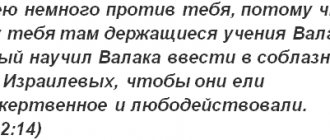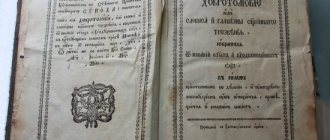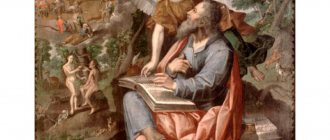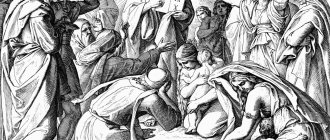Whenever we talk about reading Scripture and different ways of understanding it, there will be someone who will say: “What about the Council of Trullo? What about Saint Ignatius?
I will answer in order.
- The highest authority in the Church is Christ, who reveals his will in the Holy Scriptures and in the agreement of the Fathers of the Church. No saint can be higher than Scripture and the Teachers of the Church.
- Holy Scripture. The Holy Scripture says that the main thing is to read and do what is revealed (James 1:21-27)[1]. There is no talk of any comments, but in order to understand the will of God, you need to love God and learn to listen to His voice (Deut. 6:4-9, Exod. 19:5-6)[2]. The commandments of God themselves enlighten man (Ps. 118)[3]. It is noteworthy that Jesus reproaches the Pharisees for taking the keys of understanding and setting themselves up as teachers (Luke 11:52)[4]. God sends the Holy Spirit to every believer, who will teach and explain everything (John 14:26)[5]. Ap. Paul says that Scripture is sufficient to bring a person to salvation (2 Tim. 3:15-17)[6]. At the same time, we are saved only together, by obeying our teachers (Heb. 13:17) and edifying one another (1 Thess. 5:11)[7]. The Book of Revelation forbids adding anything to what has already been written (Rev. 22:18-21)[8]. Everything said later can only clarify, but not contradict, what is said in Scripture.
- Teachers of the Universal Church. The teachers of the Church, for example, St. John Chrysostom, the following thoughts are clearly present. There is no danger in reading the Scriptures[9]. We must read the Word of God itself; it is understandable and executable for everyone; all references to ambiguity are just excuses for not reading[10]. If it is not clear, you need to read further - it will become clearer over time, or ask experienced ones, or God will clarify by the Spirit[11]. The same thoughts are contained in the blessed one. Augustine. It is not always necessary to understand everything exactly, he adds, but it is important to have a dual love for God and neighbor; this is the main criterion for correct reading[12].
- Teachers of monasticism. The teacher of monasticism (St. John Cassian) even warns against reading commentaries (this leads to external knowledge that has no power and pride). Only he understands the Scripture correctly who cleanses his soul and corrects his life, applying the Scripture to himself, imbuing himself with it[13].
This is precisely the consent of the fathers, the consensus patrum.
Trullo Cathedral
What does the Council of Trulla tell us? And what is its significance for the Church?
To begin with, its canonical status is unclear. The Roman Church, which was then supreme in honor, did not recognize the council and even considered a number of provisions false. He went down in history as the fifth or sixth, and in fact is local, not Ecumenical.
Among other decrees, this council prohibits lay people from teaching. Let's abolish all positions of parish catechists and expel lay teachers from seminaries and academies? This council excommunicates everyone who visits the circus, and even forbids... being treated by the Jews, as well as going to the bathhouse with them - on pain of excommunication! Now these decisions can make you smile. But at that time this testified to the deep theological illiteracy of the population, that people could easily deviate into heresy or even Judaism, and the entertainment was such that a decent person should not appear there. At the same time, the council issued many good decrees, for example, to excommunicate from the Church the owners of brothels and those who perform abortions, and to spend Bright Week in spiritual joy. In general, the council was of a protective nature and testified to the deep decline of church education and moral life.
And so, in particular, the council issues a decree so that on Sundays none of the pastors teach contrary to what the fathers said: “The heads of churches must on all days, especially on Sundays, teach the entire clergy and people the words of piety, choosing from the Divine Scriptures true thoughts and reasoning, and without transgressing the already established limits and traditions of the God-bearing father. And if the word of Scripture is examined, then let it be explained no differently than the luminaries and teachers of the church have expounded in their writings. And let them be more satisfied with this than with composing their own words, so that, if they lack skill in this, they do not deviate from what is proper. For, through the teaching of the above-mentioned fathers, people, receiving knowledge of what is good and worthy of election, and of what is unprofitable and worthy of disgust, correct their lives for the better, and do not suffer from the disease of ignorance, but by listening to the teaching, they encourage themselves to move away from evil, and, through fear threatening punishments, work out their own salvation” (Rule 19).
Obviously, this rule was supposed to correct a) the vice that sermons were rarely delivered, the people were left without edification b) when they were delivered, they were so illiterately composed that they did not teach anything good and useful. So the council decides that they should teach as the truly wise and knowledgeable fathers taught.
What do the decrees of this council have to do with reading Scripture at home and trying to understand Scripture, or discussing it in a group? None. No one preaches in the group; rather, they share and testify. The problems facing Christians today are very different. They will not get involved in the Christological disputes that characterized the time of the Council of Trulla. Information about the correct teaching is just too accessible, I have read it more than once, there are many “educated” people, but life just doesn’t change. And the task today is to learn not with your head, but with your heart, to prayerfully live the texts of Scripture and fulfill them in life. Fathers can help with this, of course, and at the initial stage of churching it is useful to read Scripture with their comments, but one should not think that it is impossible to read Scripture without them.
St. Ignatiy Brianchaninov
Now let's turn to St. Ignatius. He lives in difficult times. The Fathers of the Church are just beginning to be translated into Russian; they are not known. The level of education of the clergy is low. Many sermons are still impossible to listen to, they are so illiterately composed; What’s more, they serve not according to the text of the service book, but from memory, with numerous errors. But there is a lot of translated mysticism, and the intelligentsia greatly favors Catholicism and Freemasonry.
St. Ignatius tries to counter this by insisting that Scripture must be understood as it was interpreted by the Church Fathers by the Holy Spirit (of course, Freemasonry and spiritualism knew other spirits...). His merit is that he calls for a return to the ascetic tradition of the Orthodox Church, and to read Scripture not academically, not according to Latin and French copybooks, but through the path of prayer. Like the great teachers of the Church, he insists on active study of the Gospel. He also talks about constantly meditating on the Gospel, even learning it by heart. He talks about the importance of prayer and purity...
But at the same time, unfortunately, he has accents that are completely uncharacteristic of the great teachers of the Church: “When opening a book... do not look for delight or brilliant thoughts... do not play with your eternal fate!” (How different this is from St. John Chrysostom, who calls to take a book and read, wondering and admiring the beautiful sayings and thoughts, fearing nothing but sin!) In St. Ignatius hears a rather pessimistic assessment of believers as sinners, “walling in the stinking swamp of sins.” (How different this is from the approach of the Apostle Paul, who tries to inspire his listeners, encourage them to virtue, calls them “saints, chosen and beloved of God”!) Ignatius has contempt for education: “Esopus’s fables and other insignificant things.” (What would St. Basil the Great say about this, who wrote the work “On the Use of Pagan Writings for the Education of Youth”?)…
And finally, Ignatius has the idea that one cannot read and interpret Holy Scripture on one’s own, because this is the work of the Spirit, and the Spirit is given only to the Fathers. If you understand it in your own way, then you reject Scripture itself[14]. Sharply and categorically.
First, it is not entirely clear what it means to “explain Scripture arbitrarily.” Is it St. himself? Ignatius did not undertake to interpret Scripture brightly, impressively, but in his own way (see his interpretation of Psalm 99)?
Secondly, is not the Holy Spirit given to the whole Church, in the present time as well as in the past? The Fathers taught us to acquire the Holy Spirit in prayer. Rev. Seraphim reads Holy Scripture without interpretation, otherwise how could he reread the entire New Testament in a week? Or maybe St. Ignatius had in mind the Fathers of the Philokalia, who teach spiritual life, i.e. interpret Scripture?.. And then we misunderstand it when we talk about the need for commentaries? Works of St. Ignatius are written poetically, topical for their time, but they are not written accurately, and they contain opinions that are not general church ones. It is impossible to draw final conclusions from them.
About the benefits of spiritual reading
Man will not live by bread alone, but by every word of God (Luke 4:4). These are the words of the Savior Himself, which He uttered during His temptation in the desert. Thus, He showed how much more important food for the immortal soul is than bodily food.
Saint John Chrysostom speaks about it this way:
As bodily food is for maintaining our strength, so is reading the Scriptures for the soul. It is spiritual food that strengthens the mind and makes the soul strong, firm and intelligent, and does not allow it to be carried away by irrational passions.
It is impossible to consider yourself a Christian and at the same time not know the Holy Scriptures, in which, as St. Augustine put it, God talks to us. And the same John Chrysostom argued that reading Scripture, stronger than fire, softens a hardened soul and makes it capable of everything beautiful.
But an Orthodox Christian turns not only to the Bible, but also to the lives of saints and the spiritual heritage of the Church Fathers.
The Holy Fathers loved to compare spiritual books with a mirror into which the soul peers to see its shortcomings. One glance at the sacred books excites one to a pious life, said Saint Epiphanius of Cyprus.
That is why this reading is also called soulful. And indeed, nowhere will you find so much wisdom, examples of piety and fulfillment of the commandments as in such literature. This is all the more important in our times when there is a lack of spiritual guidance. To a large extent, the patristic works can fill it.
The opinion of the Church in the person of St. Philaret of Moscow
It is not surprising that the much more educated Metropolitan Philaret of Moscow even prevents Ignatius from publishing[15]. Saint Philaret not only does not recognize the texts of Ignatius as inspired, but also considers some of them (with criticism of Thomas a à Kempis, for example) unnecessary and harmful. And regarding Holy Scripture, he himself expresses the opinion that enlightened interpreters of Holy Scripture are, of course, useful, but for Christians they are “little enlightened.” He emphasizes that “ Everything necessary for salvation is set out in the Holy Scriptures with such clarity that everyone who reads it with a sincere desire to be enlightened can understand it... “[16] In this, it seems, it is St. Filaret returns to the spirit and even the letter of the ancient Teachers of the Church.
Dear reader, read the texts we referred to in this article and draw the right conclusions.
Attention. This article does not say how to read the Bible; it only discusses incorrect references to the Council of Trulla and St. Ignatius. The author’s point of view on how to read the Bible is expressed in a series of letters “How to Read the Bible” and in the methodological manual “Gospel Readings as a Form of Work with Students and Adults,” 4th edition.
===============================
Quoted texts:
[1] 21 Therefore, putting aside all uncleanness and any remaining wickedness, receive with meekness the implanted word, which is able to save your souls. 22 Be ye therefore doers of the word, and not hearers only, deceiving yourselves.
23 For whoever hears the word and does not do it is like a man looking at the natural features of his face in a mirror: 24 he looked at himself, walked away, and immediately forgot what he was like.
25 But whoever looks into the perfect law, [the law of] freedom, and continues in it, he, being not a forgetful listener, but a doer of the work, will be blessed in his action.
26 If anyone among you thinks that he is godly and does not bridle his tongue, but deceives his own heart, his religion is empty. 27 Pure and undefiled godliness before God and the Father is this: to look upon orphans and widows in their afflictions and to keep oneself unspotted from the world. (James 1:21-27)
[2] 4 Hear, O Israel: The Lord our God is one Lord;
5 And you shall love the Lord your God with all your heart and with all your soul and with all your strength.
6 And these words which I command you today shall be in your heart.
7 And teach them to your children, and speak of them when you sit in your house, and when you walk by the way, and when you lie down, and when you rise up;
8 And you shall bind them as a sign on your hand, and let them be as a blindfold over your eyes,
9 And you shall write them on the doorposts of your house and on your gates. (Deut.6:4-9)
5 Therefore, if you will obey My voice and keep My covenant, then you will be My possession above all nations, for all the earth is Mine, 6 and you will be to Me a kingdom of priests and a holy nation; These are the words that you will speak to the children of Israel. (Ex.19:5-6)
[3] 97 How I love Your law! I think about it all day.
98 By Your commandment You have made me wiser than my enemies, for it is always with me.
99 I have become more understanding than all my teachers, for I meditate on Your revelations.
100 I am more knowledgeable than the elders, for I keep Your commandments.
101 I have kept my feet from every evil way, to keep Your word;
102 I do not shrink from Your judgments, for You teach me.
103 How sweet are Your words to my throat! better than honey to my lips.
104 I am admonished by Your commandments; That’s why I hate every path of lies.
105 Your word is a lamp to my feet and a light to my path. (Ps. 119:97-105)
[4] Woe to you lawyers, because you took the key of understanding; you yourselves did not enter, and you hindered those who entered. (Luke 11:52)
[5] But the Comforter, the Holy Spirit, whom the Father will send in My name, will teach you all things and remind you of everything that I have said to you. (John 14:26)
[6] 15 Moreover, from childhood you have known the sacred scriptures, which are able to make you wise for salvation through faith in Christ Jesus. 16 All Scripture is given by inspiration of God and is profitable for teaching, for reproof, for correction, for training in righteousness, 17 so that the man of God may be complete, equipped for every good work. (2 Tim. 3:15-17)
[7] Therefore encourage one another and build one another up, just as you are doing. (1 Thess. 5:11)
Obey your teachers and be submissive, for they are vigilantly watching over your souls, as those who are obliged to give an account; so that they do this with joy, and not sighing, for this is not good for you.
(Hebrews 13:17)
[8] 18 And I also testify to everyone who hears the words of the prophecy of this book: If anyone adds anything to them, God will add to him the plagues that are written in this book; 19 And if anyone takes away anything from the words of the book of this prophecy, God will take away his part from the book of life and from the holy city and from what is written in this book. 20 He who testifies to this says: I am coming quickly! Amen. Hey, come, Lord Jesus!
21 The grace of our Lord Jesus Christ be with you all. Amen. (Rev.22:18-21)
[9] As for the Divine Scriptures, these spiritual precious stones, here there is no danger to be suspected, and the work is not great, and the benefit is unspeakable (St. I. Chrysostom. On the book of Genesis. Conversation 9, §1).
[10] Another says: “I do not understand what is contained in the Holy Scriptures.” But here everything is clear and simple; everything you need is clear. In any case, you know what is said there clearly, in order to ask about what is not clear... All these references to ambiguity are just pretexts and empty words” (St. I. Chrysostoms. 2 Thess. 3.4).
It is impossible for you not to understand everything equally. For this is why the grace of the Holy Spirit arranged that these books were compiled by publicans, fishermen, tabernacle workers, shepherds of sheep, simple and unlearned people, so that everyone could understand what was being said. Not for vain glory, like the external sages, but for the salvation of those who listen, those who were initially rewarded with the grace of the Spirit put all this together. Indeed. For whom is it unclear what is contained in the Gospel? Who, hearing that the bliss of meekness, the bliss of mercifulness, the bliss of purity of heart (Matthew 5:5) and other similar things, will need a teacher to understand this? You say: “not everyone understands signs, wonders, and historical accounts.” This is just an excuse and a cover for laziness. How can you understand when you don’t even want to look at a book? Take a book in your hands, read the whole story, retain what is understandable in your memory, and read the unclear and incomprehensible parts several times. If, even with constant reading, you cannot comprehend what is being said, go to the wisest, go to the teacher. If, finally, a person does not explain to you what you are looking for, then God Himself will not despise your solicitude and will undoubtedly reveal it to you” (St. I. Chrysostom. About Lazarus 3.3).
[11] If you don’t understand something today, you will understand it tomorrow; you just need to train your ears by listening to the Divine Scriptures. (St. I.Zlat. On Heb. 8.4).
[12] The fullness and purpose of the Law and all Holy Scripture is Love... Hence, whoever, when interpreting the word of God, thinks that he has understood the Holy Scripture or some part of it, and yet his understanding does not edify anyone in the above-stated twofold love for God and neighbor, he has not yet understood the Scripture. On the contrary, whoever extracted from it thoughts useful for edification in love, even if sometimes he did not say exactly what the Writer he was explaining wants to say in a certain place, however, his mistake is harmless: he, of course, is deceived, but not lies... Thus, whoever, when interpreting Scripture, derives a meaning different from that which the Writer he was explaining had, he, of course, is deceived, although the fault of this deception is not Scripture, which never deceives. But if this meaning, incorrectly extracted during explanation, edifies in love, which is the end of the law, then the explainer is deceived in the same way as a traveler is deceived who, by mistake, leaving the straight road, goes through the field, however, to the same place where the most direct path leads. road. (Augustine. Christian Science, or the foundations of hermeneutics 1.39-41)
[13] We also saw Abba Theodore, distinguished by his holy life and knowledge not only in his active life, but also in the Holy Scriptures, which he acquired not through reading or study, but only through purity of heart, because he barely knew a few Greek words. To resolve one dark issue, he prayed continuously for seven days and nights, and God revealed to him how to resolve the issue.
When some brothers were surprised at his clear concepts and asked him to clarify some passages of Holy Scripture, he said: a monk who wants to understand Holy Scripture should not so much read interpreters as cleanse his heart from carnal vices. If these vices are destroyed, then, having removed the veils of passions, the eyes of the soul will contemplate the secrets of Holy Scripture. For it was not revealed from the Holy Spirit so that we would not know it; It is dark because our spiritual eyes are covered with a veil of vices; and if they are restored to their natural health, then just reading Holy Scripture will be enough to understand its true meaning, and there will be no need for the help of interpreters, just as the bodily eyes do not need any science for vision, if only they are pure and there is no darkness. This is why the interpreters themselves have made so many differences and errors that, when they begin to interpret Holy Scripture, they do not care about purifying the spirit: due to the impurity of their hearts, they not only do not see the light of truth, but also invent many things that are contrary to the faith. (John Cassian, Works, book 5).
Ava Nesteroy. If you want to achieve true knowledge of the Holy Scriptures, then you should first try to acquire unshakable humility of heart, which, through improvement in love, will lead you not to the knowledge that arrogance brings, but to that which enlightens. For it is impossible for an unpurified soul to acquire the gift of spiritual knowledge. And therefore, with all caution, avoid that through the exercise of reading, instead of the light of knowledge and the eternal glory acquired by the enlightenment of science, you do not develop qualities that lead to death from vain pride. Then you need to try in every possible way, rejecting all worries and earthly thoughts, diligently and relentlessly engage in reading the Holy Scriptures, until constant meditation nourishes your spirit, as if transforming it into its own likeness.
Hermann. This opinion, it seems to us, is not at all based on the truth and has no plausible basis. For just as all those who have not accepted faith in Christ, through ungodly corruption, corrupt dogmas, like many of the Jews and heretics, or even of the Orthodox, who indulge in various vices, having acquired perfect knowledge of the Holy Scriptures, are famous for the vastness of their spiritual knowledge; and on the contrary, countless numbers of holy men, whose hearts are cleansed from all sinful impurity, content with the purity of simple faith, do not know the secrets of deeper knowledge. How can we reconcile the opinion that spiritual knowledge attributes to purity of heart alone?
Nesteroy. The power of a definition is misunderstood by those who do not carefully weigh all the words of the expressed opinion. We said that such people have only the beauty of speech and the art of competing, but cannot penetrate into the essence of Holy Scripture, into the hidden spiritual meaning. For true knowledge is acquired only by true worshipers of God... It is well said about those who apparently acquire some kind of knowledge, or about those who, although diligently engaged in reading sacred books and memorizing the Holy Scriptures, do not abandon carnal vices in Proverbs: like a gold ring in a pig’s nose, a woman is beautiful and foolish (Sir 15:9). To such a one it is said through the prophet: You preach My statutes and take My covenant in your mouth (Proverbs 17:16). This true, spiritual knowledge is so different from worldly learning, which is defiled by the impurity of carnal vices, that it, as we know, sometimes amazingly flourished even in some who do not know languages and are almost illiterate. This is clearly proven by the example of the apostles and many holy men who were not distinguished by the vain grandiosity of philosophers, but brought true fruits of spiritual knowledge. (John Cassian, Works, collection 14)
[14] Ascetic experiences, 5: “Whoever explains the Gospel and all Scripture arbitrarily: thereby rejects the interpretation of it by the Holy Fathers, the Holy Spirit. Who rejects the interpretation of Scripture by the Holy Spirit; he, without any doubt, rejects the Holy Scripture itself.”
[15] For Metropolitan Philaret’s moderate taste in everything, Archimandrite Ignatius looked too radical. Here are two characteristic quotes from Metropolitan Philaret’s letters: “You see, Fr. The archimandrite of the Sergius Hermitage wrote a book against Thomas a à Kempis and wants me to see it, and prompted him to publish it. I don’t hope that if I read the book, I could write something about it that he would like. The idea of writing an edifying book specifically against the book of Thomas à Kempis seems strange to me. It seems to me that it is most convenient to continue the silence in which I have remained involuntarily until now” (Letters of Metropolitan Philaret of Moscow to Archimandrite Anthony. Part II. M., 1883). “At the same time, I remember my conversation with the Desert Archimandrite Ignatius. He disapproved of the book about the imitation of Christ so much that he forbade it to be read. I objected to him that Saint Demetrius cites the words of this book, stipulating that Thomas a Kempis, although a foreign merchant, brings good goods. The archimandrite answered me: we do not know when Saint Demetrius was introduced into the grace-filled dignity of a holy father, and perhaps he wrote what I indicated even when he was simply a pious writer or preacher” (Letters of Metropolitan Philaret of Moscow to Archimandrite Anthony. Part IV. M., 1884).
Prejudice led to opposition. “Subsequently, Metropolitan Philaret began, no less than others, to oppose the successful career of Archimandrite Ignatius and strongly influenced the archimandrite’s works to be so altered by censors’ amendments as to discourage him from any desire to publish them in print. The censor Archimandrite Avvakum pointed to him as the main culprit of this order” (Biography of Bishop Ignatius Bryanchaninov. M., 2002. P. 207). Saint Ignatius himself, in a letter to his brother Peter Alexandrovich, wrote about it this way: “When I lived in the Sergius Hermitage, then they did not favor my works being published in print, having their own reasons. Perhaps these reasons still exist. <…> At first they didn’t tell me directly: we used our own technique for refusal. Namely: they smeared the manuscript in such a way and changed the essay in such a way that the manuscript became worthless, and the essay became alien to me and acquired a distorted appearance that could seduce the reader and make the author the laughing stock of the public. Subsequently, one censor was so kind that he said about the existence of a secret order regarding my works, after which I did not bother the censorship by presenting my works there” (Collected letters of St. Ignatius Brianchaninov, Bishop of the Caucasus and the Black Sea. Compiled by Hegumen Mark (Lozinsky). M. – St. Petersburg, 1995. pp. 724-725).
[16] An exposition of the difference between the Eastern and Western Churches in the doctrine of faith.
And here is a quote about St. Prot. Filarete G. Florovsky:
“Filaret firmly believed in the renewing power of the Words of God... He inextricably and selflessly linked his life and his name with the biblical work, with the Russian Bible. His biblical feat is difficult to appreciate properly. For him personally, it was associated with great trials and tribulations. At the very height of the anti-biblical “uprising” in St. Petersburg, Filaret in Moscow testified, on the contrary, that “the very desire to read holy books is already a guarantee of moral improvement.” And if anyone prefers to eat roots rather than pure bread, it is not the Bible Society’s fault. To the guessable question, “Why are you introducing this new thing in a matter as ancient and not subject to change as Christianity and the Bible,” Filaret answered: “Why are you introducing this new thing? But what's new here? Tenets? Rules of life? But the Bible Society does not preach anything, but puts into the hands of those who wish it a book from which the true Church has always drawn, and now is drawing, both Orthodox dogmas and pure rules of life. New society? But this does not bring any news to Christianity, does not produce the slightest change in the Church... Why do you introduce this of foreign origin? they still say. In response to this question, it would be possible to point out to my dear compatriots many things, with the same question: why do we have them not only of foreign origin, but also completely foreign ... "
As a contemporary put it, at that time “the most devout people had the unfortunate thought that people were going crazy from reading this holy book.” At one time, reading the Bible was formally prohibited for students of military educational institutions - to prevent insanity, under the pretext that two cadets were already insane. And many others “considered it a book only necessary for the Church and suitable for priests alone.” Out of fear of mystical delusions and excesses, then suddenly both Macarius of Egypt and Isaac the Syrian began to be avoided - “and intelligent heartfelt prayer was destroyed and ridiculed, like an infection and destruction...”
Somewhat later, Filaret had to prove that it is permissible to write new interpretations of the epistles of the Apostle Paul, despite the fact that Chrysostom had long ago written his explanations on them...
“Smoke eats the eyes, and they say: this is how sunlight eats.” They are choking on the smoke and have difficulty pronouncing: how harmful the water from the source of life is..."
This spirit of timid inaction in theology has always embarrassed Filaret, no matter what and where it manifests itself...”
What is the best thing to read during Lent?
Lent is a particularly blessed time for saturating our souls with the Word of God, so spiritual reading occupies an important place in it. It is impossible to imagine that a Christian would spend this period without once picking up the Bible or patristic literature.
There are two books that are given primary importance during Lent:
- Gospel;
- Psalter.
Old Testament books
Three more books are read from the Old Testament during Lent:
- Being;
- Proverbs of Solomon;
- Book of the prophet Isaiah.
They are heard most often during services in churches. The Psalter is read twice a week, the Gospel in Holy Week should be read in full. Why does the Church bring these books of Holy Scripture to our attention?
The Psalter is an example of prayer literature, which is why some even call it an “oral icon” of Christ. The main theme of Lent is repentance. Most of the psalms are also written in a penitential tone.
Reading selected Old Testament books is associated with the early tradition of baptizing all catechumens (preparing for baptism) on Holy Saturday. This custom existed in the ancient Church. It was for this purpose—teachings and instructions in faith—that the books listed were read.
Although this tradition has not been preserved in our country, reading the books of the Old Testament from the entire Holy Scripture during Lent cannot be called accidental. This entire period for each of us can be compared with the time of the Old Testament waiting for our Messiah - Jesus Christ.
Gospel reading
Therefore, the Gospel is supposed to be read only in the last, Holy Week of Lent, and in its entirety. However, due to the length of such services, in many churches the reading of the Gospel begins earlier. It’s good if at home you can also concentrate and prayerfully go through Him entirely during fasting.
In addition, of course, it is also recommended to read the books of the Holy Fathers. In addition to the famous “Ladder,” these could be the works of Theophan the Recluse, Ignatius (Brianchaninov), Abba Dorotheus, John of Kronstadt and other ascetics. You can read only one (any) of the works of these ascetics, but carefully.





